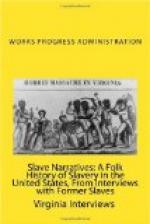“My master wouldn’t let the poor white neighbors—no one—tell us we was free. The plantation was many, many acres, hundreds and hundreds of acres, honey. There were about twenty-five or thirty families of slaves. They got up and stood until daylight, waiting to plow. Yes, child, they was up early. Our folks don’t know how we had to work. I don’t like to tell you how we were treated—how we had to work. It’s best to brush those things out of our memory.
“If you wanted to go to another plantation, you had to have a pass. If my folks was going to somebody’s house, they’d have to have a pass. Otherwise they’d be whipped. They’d take a big man and tie his hands behind a tree, just like that big tree outside, and whip him with a rawhide and draw blood every whip. I know I was scared every time I’d hear the slave say, ‘Pray, Master.’
“Once, when I was milking a cow, I asked Master Ousley, ’Master Ousley, will you do me a favor?’
“He said in his drawl, ‘Of course I will.’
“‘Take me to McCracken County,’ I said. I didn’t even know where McCracken County was, but my sister was there. I wanted to find my sister. When I reached the house where my sister stayed, I went through the gate. I asked if this was the house where Mary Meriwether lived. Her mistress said, ’Yes, she’s in the back. Are you the girl Mr. Meriwether’s looking for?” My heart was in my mouth. It just seemed I couldn’t go through the gate. I never even saw my sister that time. I hid for a while and then went back.
“We didn’t have any churches. My master would come down Sunday morning with just enough flour to make bread. Coffee, too. Their coffee was parts of meal, corn and so on. Work all week and that’s what they had for coffee.
“We used to sing, ‘Swing low, sweet chariot’. When our folks sang that, we could really see the chariot.
“Once, Jim Ferguson, a colored man, came to teach school. The white folks beat and whipped him and drove him away in his underwear.
“I wanted so hard to learn to read, but I didn’t even know I was free, even when slavery was ended.
“I been so exhausted working, I was like an inch-worm crawling along a roof. I worked till I thought another lick would kill me. If you had something to do, you did it or got whipped. Once I was so tired I couldn’t work any more. I crawled in a hole under the house and stayed there till I was rested. I didn’t get whipped, either.
“I never will forget it—how my master always used to say, ’Keep a nigger down’ I never will forget it. I used to wait on table and I heard them talk.
“The only fun we had was on Sunday evening, after work. That was the only chance we got. We used to go away off from the house and play in the haystack.
“Our folks was so cruel, the slaves used to whisper ’round. Some of them knew they was free, even if the white folks didn’t want ’em to find out they was free. They went off in the woods sometimes. But I was just a little kid and I wasn’t allowed to go around the big folks.




